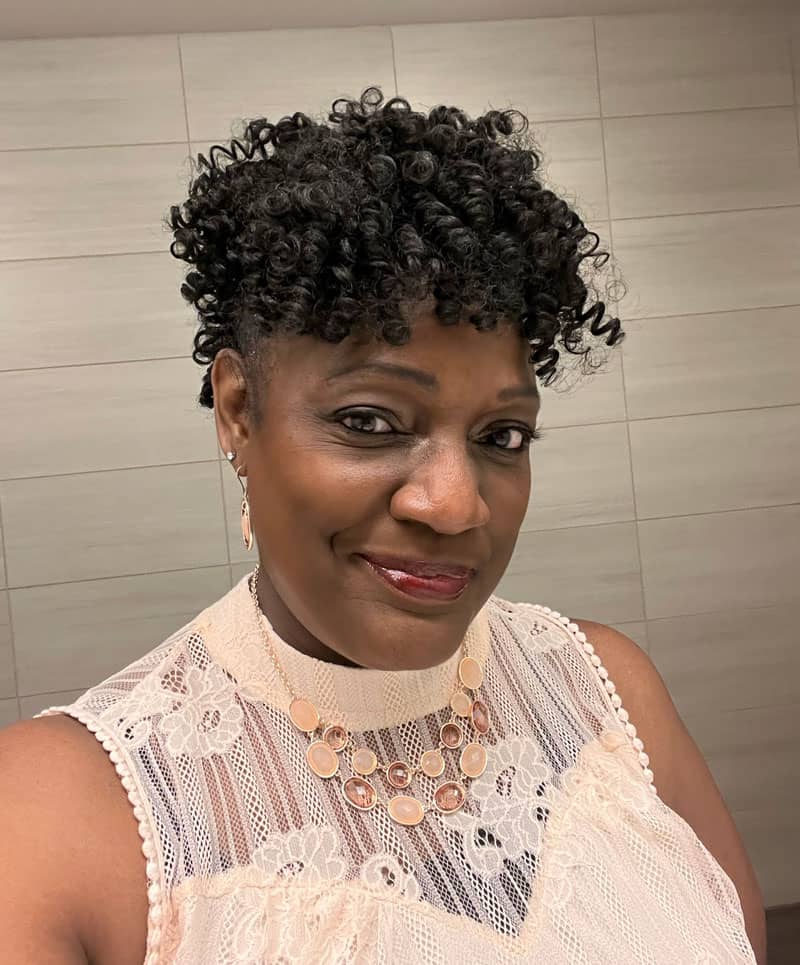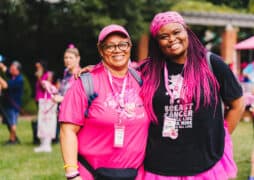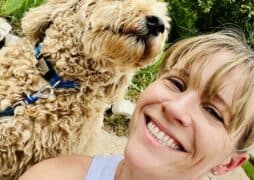
Sharon Elmore-Anderson was preparing to have knee surgery when she suddenly started experiencing heart palpitations. She went to the emergency room, where tests identified enlarged lymph nodes. She scheduled a follow-up appointment with her doctor, who asked Sharon if she had any lumps in her breasts.
“I said I didn’t have any lumps, but he did an exam on my body and found a rash in the crease underneath my breast,” Sharon said. “I didn’t even know I had a rash. It wasn’t painful. It was a tiny spot.”
Sharon’s doctor sent her for a mammogram, which showed shadows but did not look like breast cancer. Her doctor then sent Sharon for an ultrasound, which raised enough suspicion to send her for a biopsy. She was ultimately diagnosed with de novo metastatic inflammatory breast cancer (IBC) in 2013.
“Those words – inflammatory breast cancer and metastatic – were foreign to me,” Sharon said. “I never knew of a cancer that had no symptoms, no lumps, no bumps. I now know I need to stay in tune with my body because that small rash became a death sentence.”
“I felt fine. That’s the part I did not understand about IBC,” Sharon continued. “I had no signs or symptoms at that time. About a week later, my left breast started to swell a little bit. That was my first major indication that something was wrong in my body, so that’s where I began my cancer journey.”
IBC is an aggressive breast cancer that often presents as redness and swelling of the breast instead of a lump. It can progress rapidly and is often misdiagnosed – or diagnosis is delayed – resulting in a poorer prognosis. Some women are more likely than others to be diagnosed with IBC, including Black women.
Sharon decided to start an aggressive treatment plan at MD Anderson Cancer Center in consultation with her doctor. Her husband, who had been ready to retire from his job, continued working for three more years so she could have proper insurance coverage during her treatment. Still, even with insurance, they could not afford the co-payments for her treatment, which included a partial mastectomy (lumpectomy), chemotherapy and radiation therapy.
“I think it’s extremely important to advocate for yourself during treatment. Sometimes people think of the word ‘advocate’ as something where you have to go get a college degree or a lot of training,” Sharon said. “But speaking up for yourself is being an advocate.”
Sharon’s IBC, which originally spread to her lymph nodes, later spread to her spine in 2015, which she learned after having back pain.
“When I started with treatment in the spine, the treatment was a little strong, and I communicated with my oncologist because my quality of life started to change. I had a severe case of neuropathy, and I couldn’t walk. I was in a wheelchair at that time. We stopped the treatment and, from that point, the neuropathy got a little better,” Sharon said.
“That’s another part of advocating. If your treatments aren’t going well or if you’re feeling differently or having pain or other symptoms, please let your oncologist know,” Sharon continued. “That is important for them to know so they can either adjust your treatments, change your treatments or stop them.”
Sharon later discovered she had a family history of breast cancer when her aunt called her to tell her about a cousin who has metastatic breast cancer (MBC). It wasn’t something her family had ever spoken about to her previously.
“I was born in Alabama, so I understand these stories about the past and why there is mistrust and secrecy. It’s not that you have to forget, but in order for us to live and want to have a life, we need to let go of the past,” Sharon said.
“When I was being brought up, we didn’t know that anyone had cancer until they were put in the grave. I needed to know who in my family heritage had cancer because I probably would’ve thought differently if I’d known there was cancer,” Sharon said. “A lot of people may suffer from having cancer and not know that they have a heritage of it. It’s important to know your family history, and it’s important for us mothers and fathers to open up to our children.”
Black women are less likely to participate in clinical trials than white women, which Sharon identified as a major barrier to receiving high-quality breast cancer care in the Black community.
“In the Black community, there’s a stigma about treatment, clinical trials and research,” Sharon said. “We have to understand that there’s not enough data to help us if we get sick. There’s not enough data to create treatments that will help us. We need to participate in clinical trials.”
Since becoming an IBC patient advocate in 2017, Sharon estimates that half of her friends she met through advocacy work have died from MBC.
“My fear for the Black community is we need that data, because research doesn’t include enough Black people to make treatments that work for us. It’s important that we participate in research. I would like researchers to know that there are people in the Black community that would like to participate,” Sharon said.
“That’s where it starts – with one person. Maybe someone else will hear my story and feel that they can be involved in research, too,” Sharon continued. “People can connect with Susan G. Komen to get started. Researchers need that data so they can help us. Researchers are looking for us, and we’re looking for you.”
Komen’s Breast Care Helpline offers free support and information about breast health, breast cancer, local and national resources, and clinical trials from culturally responsive oncology social workers and specialists. Call 1-877-465-6636 (1-800 GO KOMEN) Monday – Thursday, 9 a.m. – 7 p.m. ET and Friday, 9 a.m. – 6 p.m. ET. Se habla español.



